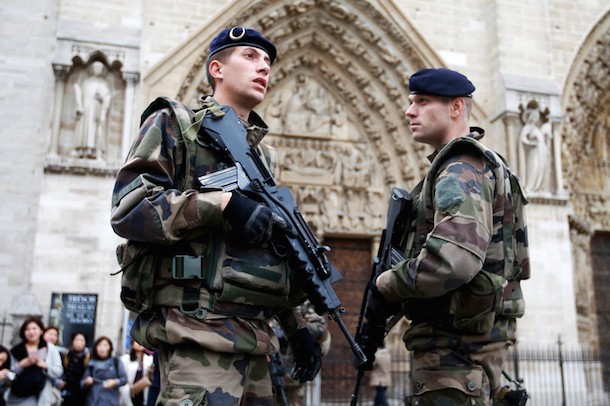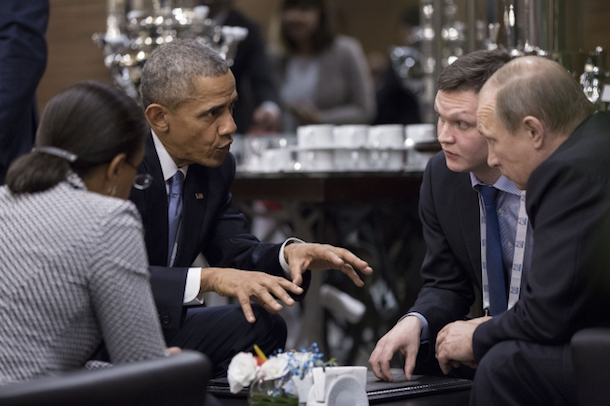
Revenge is Terrible Foreign Policy
Revenge is part of the normal human condition, but in foreign policy it can lead to unfortunate and counterproductive policy decisions. Many politicians in the United States have called for an increased military presence in Syria in the wake of recent terrorist attacks. It is imperative that a thoughtful and coordinated plan be developed so that the military is not again involved in a prolonged war similar to that in Afghanistan. Most recently the decision to invade Iraq, one could argue, was driven by a desire for revenge: “This is a guy that tried to kill my dad at one time,” President Bush said of Saddam Hussein.
Americans backed these wars over the events of September 11 and one can reasonably argue that had the U.S. and its allies not overthrown Saddam we would not be dealing with the increased threats of terrorism today.
In light of the events in Paris, some have called for France to invoke Article 5 of the NATO charter, which would prompt a more robust international response to the threat posed by Islamic State. France itself, in response to the Paris attacks, launched symbolic airstrikes against targets in Syria that had been previously approved by the United States. To be certain, the threat from Islamic State is real but does it necessitate deploying thousands of American and European troops to deal with the threat when it has been acknowledged by many that long-term stability and security cannot be assured?
The U.S. and its allies could, with a reasonable amount of certainty, defeat ISIS on the battlefield in Syria, but the question then becomes how to hold and rebuild that territory once ISIS fighters have been defeated.
Will the American or even the French public be able to accept the notion of stationing sizable forces in Syria and Iraq over the long term? If the drawdown from the war in Iraq can be any indicator, it is doubtful they would. War fatigue will dissuade nations from being fully-invested in another Middle Eastern conflict, so the world needs to devise a united front that would share responsibilities in neutralizing threats and achieving a resolution to the civil war.
Moscow Options in Syria
In September, President Obama condemned Russia’s engagement in Syria as “a strategy that is doomed to failure”; however, Russia is seemingly the only international player in the conflict that is vying to achieve resolution. The United States’ primary objective in Syria, as stated by Secretary of State Kerry, is “destroying ISIL” and only secondarily is America interested in “a political settlement with respect to Syria,” though the administration believes it “cannot be achieved with the long-term presence of Assad.” The major powers in the conflict want an end to the civil war and achieve regional stability but these goals cannot be met if they cannot find a mutually-agreeable strategy.

Russia’s current military solution to the Syrian conflict is to connect the government-held Homs and Aleppo regions as a means to reinforce the frontlines, which, in turn, would destroy militia strongholds in the north. This clearly-defined strategy has had a greater impact on the conflict than the seemingly-indiscriminate bombing campaign initiated by the West which has taken out targets but left vacuums in regions only to be filled by other militias. Western media outlets have questioned why the Assad government, with Russian assistance, has not gained momentum in the conflict. Russia has acknowledged that there will not be a military solution to this war.
Russia’s Syrian strategy is flawed for it entails retaking lands held by rebels, which will require a long engagement with boots on the ground. Even if mostly successful, militants will eventually be forced underground where terrorist campaigns will begin anew. Moreover, Russia envisions a Syria where Assad remains in power until a national election is completed but after this amount of blood letting it cannot be realistically expected that any anti-government leader would accept this proposal, especially since Moscow desires a ‘full spectrum’ negotiation involving all parties in Syria.
If Russia cannot bomb or negotiate its way out of Syria, President Putin will risk losing political credibility and exacerbate economic tensions at home, and potentially face increased Muslim reprisals on its borders. Russia may not be the West’s closest ally but the world can ill-afford further destabilization.
United States in Syria
It is time for American politicians to stop the Cold-War rhetoric and work constructively with Moscow in Syria. The primary issue in Syria, without a political solution to the civil war, is that, except for the Kurds, there are no moderate, indigenous forces to hold territory taken from ISIS. This seems to be the primary reason why the US abandoned its unsuccessful program to train rebel fighters.
Russia’s attempts at a diplomatic resolution to the violence do illustrate its desire to end the bloodshed; however, Moscow cannot be expected to achieve success in the negotiations without additional support. Political leadership is needed even though there seems little hope Syria will become a pluralistic society because after the violence ends the memory of Assad regime’s brutality will linger. The world cannot expect to walk away from the issues in Syria and hope that they will resolve themselves on their own.
From its outset, America’s policy has been extremely apolitical – destroying ISIS with air power without developing a comprehensive, on-the-ground counterinsurgency strategy to hold territory. Furthermore, America’s plan for containing ISIS is not manageable. Under America’s current plan, the organization would be ‘contained’ in eastern Syria and western Iraq which encompasses a large swath of land. True containment would mean ISIS would remain in eastern Syria, only, and increased border security would provide stability for the fledgling Iraqi government.
The ISIS Dilemma
Syria is a counterinsurgency nightmare in the making and this is causing the world to hold the conflict at arm’s length. Calls for a political solution can no longer be ignored though a diplomatic solution will be a difficult challenge for all sides. The current conflict in Syria is a slow burn and putting boots on the ground could cause the war to heat up, killing more civilians in the process, and shorten the timeframe for brokering deals. Negotiations take time and if the conflict ramps up more people will be killed before a settlement can be reached – we cannot, as Obama put it, “shoot first and aim later.”
ISIS may be a regional problem but we should expect ISIS to take this conflict the full distance as it continues to fan the flames of violence. Neither a negotiated peace, military settlements, nor compromise can be achieved when an adversary subscribes to this type of logic. We understand all too well from the Iraq war that once the antagonists have been defeated troops are needed to remain on the ground to hold territory and restore order. This is where the open-ended nightmare begins.

If the West is not willing to put boots on the ground would Western leaders be willing to accept one of the war’s counterparts – Russia or Iran – to maintain order? If we do not trust these countries while we are bombing the same adversary then what hope does the future hold? It would be wise to support Putin’s fight in Syria and let Moscow take the lead. Washington should want Russia to be successful because the alternative would result in terrible outcomes for the West in its ultimate goal of eradicating terrorism.
The Parisian Impact
Domestically, as the election season heats up many GOP candidates are calling for a more robust response. While the few serious candidates running have been right to criticize Obama for not doing enough as ISIS took territory from the Iraqi government, their overall response has been shrill. Several candidates are calling for a moratorium on the U.S. plans to accept any more refugees. However, at least one candidate has suggested just letting in Christian refugees. “There is no meaningful risk of Christians committing acts of terror. If there were a group of radical Christians pledging to murder anyone who had a different religious view than they, we would have a different national security situation,” Sen. Ted Cruz suggested this past weekend.
However Obama responds militarily to the attacks in Paris and the threat to the U.S. homeland, a knee jerk response would likely fulfill that sense of revenge but it would do little to change the realities on the ground in Syria and Iraq. The killing of ‘Jihadi John,’ Osama bin Laden and several other high value targets suggested a sense of relief but the operational capacity of Al Qaeda and Islamic State has not fundamentally changed. Additionally, a U.S. Special Forces raid could target and kill the mastermind of the Paris attacks, but again the group would still pose a threat to Europe and the United States.
The Neoconservative Strategy
Neoconservatives in the West would have us believe that shutting down the refugee program will keep us safe. This plays into ISIS’ hands as a clash of civilizations. In fact, if an Islamic State supporter were going to attack the United States, trying to enter through the refugee program isn’t the best way to do it. It already takes several years to pass through all the various levels of red tape.
The knee-jerk reaction after Paris that has caused many to suppress their humanity by demanding a moratorium to refugee program is an approach that isn’t likely to succeed. For a refugee to enter the U.S. the screening process can last anywhere from 18 to 24 months. During this arduous process, the applicants are screened, background checks are done and multiple interviews are conducted. Christopher Boian, with the United Nations High Commission for Refugees, told CNN that the process is “stringent” and “long and complex.”
Tough Rhetoric Alone Won’t Work
Ultimately, the Obama administration will have to come to terms with the fact that its strategy to date has been an abysmal failure. A lot of credit has to go to the Bush administration for realizing that its strategy in Iraq was not working. It revised its strategy and revamped its approach on the ground. And while the decision wasn’t particularly popular it did yield results on the ground.
The Obama administration, and Obama in particular, has yet to come to terms with the fact that rhetoric and bombs alone will not defeat ISIS on the ground in Syria. It might very well have to work cooperatively with Russia and focus solely on Islamic State militants and leave Assad in place.
Appearing on “State of the Union,” Chuck Hagel, Obama’s former Secretary of Defense, stressed this very same approach. “There is no military solution to this. We are up against an ideology, we are up against a reality, a set of dynamics we’ve never seen before — sophistication of social media, the military prowess, the tactical strategic prowess that ISIS possesses, the funding,” Hagel said. “So we should more clearly define, what are our political strategies? What are our priorities? Is Assad the enemy or is ISIS the enemy?” Ultimately, Hagel stressed that it’s ISIS that poses the real threat, not Assad.
Assad will eventually have to step down as part of a negotiated agreement, but the U.S. approach until now has been unsuccessful and unworkable.
Obama’s Unmovable Position
With France’s President Francoise Hollande visit with Obama at the While House this week and news that Turkey shot down a Russian warplane over its territory, events in Syria have the potential to dominate U.S. foreign policy for the next decade unless Obama changes course. It’s a sad reality, that the French sound more hawkish than the United States.


